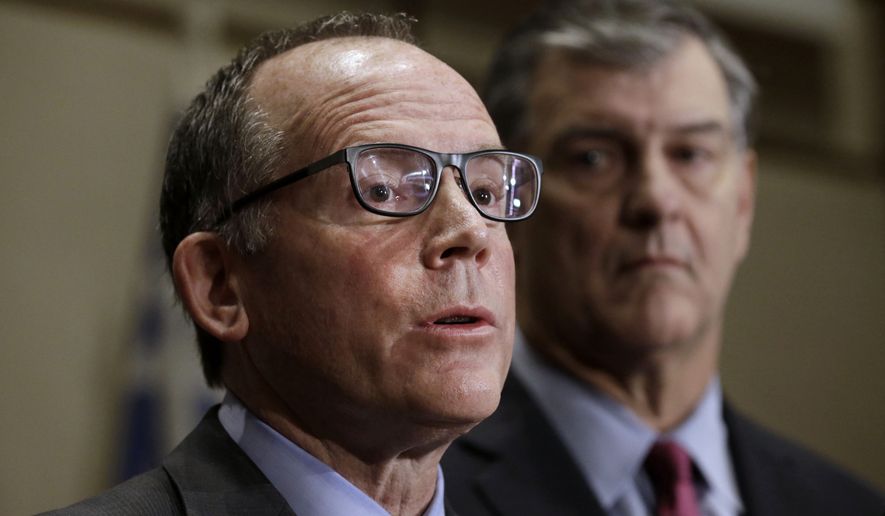The second health care worker in Texas who tested positive for Ebola should not have traveled by air with other passenger the day before she reported symptoms, the Centers for Disease Control and Prevention (CDC) said Wednesday, although she will be transferred to a specially equipped hospital in Atlanta.
“She should not have traveled on a commercial airline,” CDC Director Tom Frieden said on a conference call. He said officials will ensure that people who came into contact with infected patients do not travel in an unrestricted manner.
It was unclear if the worker inadvertently broke protocol or flouted the rules.
Dr. Frieden stressed that the first health care worker to test positive, a 26-year-old nurse in Dallas, had not fallen ill yet and that the second health care worker did not exhibit symptoms during her travel, making the risk to fellow passengers “extremely low.”
The second worker, who provided care for the first Ebola patient diagnosed in the United States, reported a fever Tuesday and was immediately isolated at Texas Health Presbyterian Hospital, according to the Department of State Health Services.
She is ill but clinically stable, and will be transferred to Emory University for further treatment.
Meanwhile, the airline she used began to reach out to fellow passengers as a precaution.
“Because of the proximity in time between the evening flight and first report of illness the following morning, CDC is reaching out to passengers who flew on Frontier Airlines flight 1143 Cleveland to Dallas/Fort Worth Oct. 13,” CDC said in a statement.
The CDC is asking all 132 passengers on the flight to call 1-800-CDC INFO (1 800 232-4636). Public health professionals are scheduled to start interviewing passengers Wednesday, and individuals who are determined to be a potential risk will be “actively monitored.”
Frontier Airlines said the plane was thoroughly cleaned, per normal procedure, before returning the service the next day.
“The safety and security of our customers and employees is our primary concern,” the airline said in a statement. “Frontier will continue to work closely with CDC and other governmental agencies to ensure proper protocols and procedures are being followed.”
President Obama canceled his afternoon travel plans and called a cabinet meeting on the response to Ebola, while officials in Texas said earlier Wednesday that they are preparing for more contingencies.
Dr. Daniel Varga, chief clinical officer for Texas Health Resources, said the new case, “while concerning and unfortunate,” is continued evidence that their monitoring program is working for people who may have come in contact with Thomas Eric Duncan, who died last Wednesday at the hospital after being infected with the virus.
“The health and safety of our patients and employees remains our highest priority,” Dr. Varga said. “A lot is being said about what may or may not have occurred to cause some of our colleagues to contract this disease, but it’s clear there was an exposure somewhere, sometime in their treatment of Mr. Duncan.”
Nina Pham, a nurse who also cared for Mr. Duncan, tested positive for the deadly virus over the weekend but has since reported she is “doing well.”
Dr. Frieden said both health care workers were exposed to Duncan during his early days of hospitalization, when he suffered from a “substantial” amount of vomiting and diarrhea.
“Our investigations increasingly suggest that the first several days before the patient was diagnosed appear to be the highest-risk period,” Dr. Frieden said.
Dallas Mayor Mike Rawlings said fire and rescue workers were in the process of decontaminating the area around a city apartment and that the patient lived alone and had no pets and that neighbors are being notified.
“The only way that we are going to beat this is person by person, moment by moment, detail by detail,” Mr. Rawlings said. “We want to deal with facts, not fear, and I continue to believe that while Dallas is anxious about this and with this news this morning the anxiety level goes up a level, we are not fearful.”
“It may get worse before it gets better, but it will get better,” he said.
National Nurses United, the largest union of registered nurses in the U.S., said late Monday that hospital workers in Dallas were put at risk during Mr. Duncan’s second visit, when his family members suspected he had Ebola.
Mr. Duncan was not isolated right away and protective suits for nurses exposed many areas of their bodies, they said, citing unidentified nurses from the hospital.
“We’re deeply alarmed. We’ve been sounding the alarm,” said RoseAnn DeMoro, executive director of National Nurses United.
She insisted the union was raising legitimate concerns, and not “fear-mongering.”
The statement from Dallas nurses said test samples from Duncan were not specifically sealed or handled differently, potentially contaminating areas of the hospital.
“There was no protocol, there was no system,” the statement read.
Dr. Varga, though, said he does not believe there is a systematic or institutional problem in the hospital’s response.
“We’re a hospital that may have done some things different with the benefit of what we know today, but [make] no mistake: no one wants to get this right more than our hospital,” he said.
Meanwhile, Texas Gov. Rick Perry offered his support for those on the front lines.
“Everyone working on this challenge — from the medical professionals at the bedside to the public health officials addressing containment of the infection — is working to end the threat posed by this disease,” the Republican said. “These individuals are keeping the health and safety of Texans and the needs of the patients as their most critical tasks. Every relevant agency at the local, state and national levels is working to support these individuals.”
• Tom Howell Jr. can be reached at thowell@washingtontimes.com.
• David Sherfinski can be reached at dsherfinski@washingtontimes.com.




Please read our comment policy before commenting.